

Can Health Apps Help Patients Change Their Behavior? App’d to Fail: Mobile Health Treatments Fail First Full Checkup. Health care via mobile technology is still in its infancy.
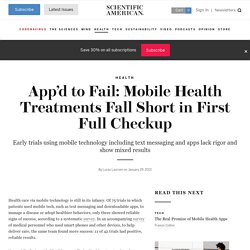
Of 75 trials in which patients used mobile tech, such as text messaging and downloadable apps, to manage a disease or adopt healthier behaviors, only three showed reliable signs of success, according to a systematic survey. In an accompanying survey of medical personnel who used smart phones and other devices, to help deliver care, the same team found more success: 11 of 42 trials had positive, reliable results. Yet mobile device-aided health care, called mHealth, attracts a lot of attention and dollars, as U.S. National Institutes of Health director Francis Collins wrote last year in Scientific American. In 2012 venture capital firms invested more than $900 million in mHealth, according to a report by Mobile Health Market News. In the first review, the team identified 334 relevant mHealth trials in seven medical databases. Many health apps are based on flimsy science at best, and they often do not work.
Since then, the Food and Drug Administration has been mired in a debate over how to oversee these high-tech products, and government officials have not pursued any other app developers for making medically dubious claims.
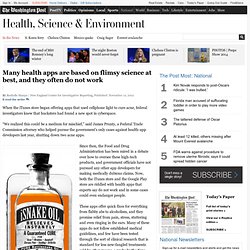
Now, both the iTunes store and the Google Play store are riddled with health apps that experts say do not work and in some cases could even endanger people. These apps offer quick fixes for everything from flabby abs to alcoholism, and they promise relief from pain, stress, stuttering and even ringing in the ears. Many of these apps do not follow established medical guidelines, and few have been tested through the sort of clinical research that is standard for less new-fangled treatments sold by other means, a probe by the New England Center for Investigative Reporting has found.
While some are free, thousands must be purchased, at prices ranging from 69 cents to $999. ‘Bogus’ claims. Wanted: The bottom 10 worst medical apps. At the beginning of the year I received a call from Pulitzer-prize winning journalist and investigative journalism professor Rochelle Sharpe, who was planning to begin a project that looked at some of the worst medical apps available — or previously available — in app stores.
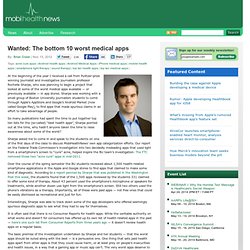
Sharpe was working with a small group of Boston University journalism students to comb through Apple’s AppStore and Google’s Android Market (now called Google Play), to find apps that made spurious claims in an effort to take advantage of people. So many publications had spent the time to put together top ten lists for the (so-called) “best health apps”, Sharpe pointed out at the time, why hadn’t anyone taken the time to raise awareness about some of the worst? New app maps patients' health risks. IndiGO, an application developed by San Francisco-based Archimedes Inc., uses a patient's EHR and advanced algorithms to generate graphical analyses of that individual's health risks. The app brought its game face to last week's Health Data Initiative (HDI) in Washington, D.C., eventually walking away with a win.
IndiGO was presented with the "Best of Care Applications" award at the HDI event earlier this month for its ability to provide a graphical representation of a patient’s heart attack or stroke risk, chance of developing diabetes and the predicted impact of interventions, such as lifestyle changes and medications that are most effective at reducing these risks. [See also: Application to boost data, trends analyses.]
The algorithms that make this possible incorporate clinical evidence related to diseases, behaviors and interventions. [See also: IT Adoption: The rules of the game must change.] The Real Promise of Mobile Health Apps. As a volunteer in a trial of mobile health technology, I can attest that it's incredibly cool to pick up your iPhone, fire up an application to monitor your heart rate and rhythm, and then beam your ECG reading to a cardiologist halfway around the globe.
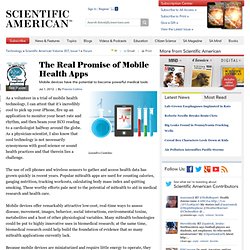
As a physician-scientist, I also know that cool technology is not necessarily synonymous with good science or sound health practices and that therein lies a challenge. The use of cell phones and wireless sensors to gather and access health data has grown quickly in recent years. Popular mHealth apps are used for counting calories, gauging nutrition, tracking workouts, calculating body mass index and quitting smoking. These worthy efforts pale next to the potential of mHealth to aid in medical research and health care. Mobile devices offer remarkably attractive low-cost, real-time ways to assess disease, movement, images, behavior, social interactions, environmental toxins, metabolites and a host of other physiological variables. New smartphone app targets clinical miscommunication.
With more and more doctors using their smartphones to conduct business outside of the office, the potential for communication errors – ranging from misunderstood directions to "he-said-she-said" moments – is increasing dramatically.
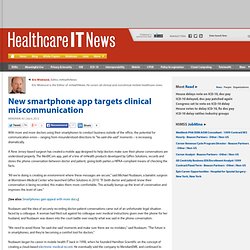
A New Jersey-based surgeon has created a mobile app designed to help doctors make sure their phone conversations are understood properly. The MedXCom app, part of a line of mHealth products developed by Giffen Solutions, records and stores the phone conversation between doctor and patient, giving both parties a HIPAA-compliant means of checking the facts. "All we're doing is creating an environment where these messages are secure," said Michael Nusbaum, a bariatric surgeon at Morristown Medical Center who launched Giffen Solutions in 2010. "If (both doctor and patient) know their conversation is being recorded, this makes them more comfortable. This actually bumps up the level of conversation and improves the level of care.
" Wouldn't it be great if… The Lancet Technology: June, 2012. “GPs to ‘prescribe’ apps for patients” declared a press release from the UK Department of Health earlier this year.
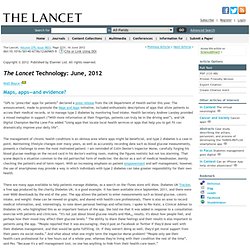
The announcement, made to promote the Maps and Apps initiative, included enthusiastic descriptions of apps that allow patients to access their medical records, or to manage type 2 diabetes by monitoring food intake. Health Secretary Andrew Lansley provided a mixed metaphor in support (“With more information at their fingertips, patients can truly be in the driving seat”), and UK Digital Champion Martha Lane-Fox added “Using apps that locate local health services or apps that help you to get fit can dramatically improve your daily life”. There are many apps available to help patients manage diabetes, as a search on the iTunes store will show.
Diabetes UK Tracker, a free app produced by the charity Diabetes UK, is a good example. 5 steps to making your medical app idea a reality. By: Craig Monsen, MS [Ed.
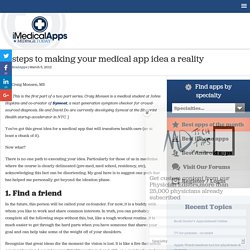
This is the first part of a two part series. Trial program lets docs 'prescribe' mHealth apps to patients. Mobile Medical Apps Gold Rush Needs Scrutiny - Healthcare - Mobile & Wireless. The problem with this kind of booming market?
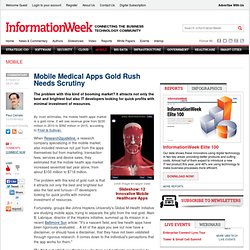
It attracts not only the best and brightest but also IT developers looking for quick profits with minimal investment of resources. (click image for larger view) The Journal's App for the iPad. Thanks to a newly built software application (or “app”), the Journal can now be downloaded and read in an issue format on the iPad.
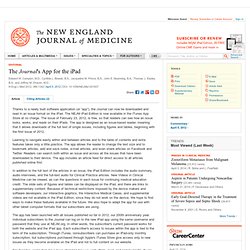
The NEJM iPad Edition is now available in the iTunes App Store at no charge. The issue of February 23, 2012, is free, so that readers can see how an issue looks, works, and reads on their iPads. The app is designed as an issue-based reader, meaning that it allows downloads of the full text of single issues, including figures and tables, beginning with the first issue of 2012. Learning to navigate easily within and between articles and to the table of contents and extra features takes only a little practice. The app allows the reader to change the text size and to bookmark articles, add and save notes, e-mail articles, and even share articles on Facebook and Twitter. In addition to the full text of the articles in an issue, the iPad Edition includes the audio summary, audio interviews, and the full-text audio for Clinical Practice articles. 4 tips for start-up health IT companies. Start-up health IT companies have made quite a splash this past year – with some even claiming they have the ability to change the healthcare industry as we know it.
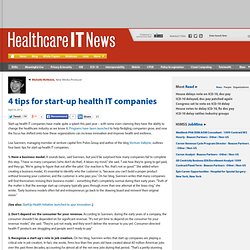
Programs have been launched to help fledgling companies grow, and now the focus has shifted onto how these organizations can increase innovation and improve health and wellness. Lisa Suennen, managing member at venture capital firm Psilos Group and author of the blog Venture Valkyrie, outlines four basic tips for start-up health IT companies. 1. Have a business model. It sounds basic, said Suennen, but you'd be surprised how many companies fail to complete this step. Fitocracy's First App Makes Fitness Tracking Competitive. Instead of just tracking your workouts, a new iPhone app called Fitocracy lets you compete against other users and friends. The startup has been running a browser-based social fitness contest without a native mobile component since February 2011. Its 250,000 registered users earn points by logging fitness activities in order to “level up,” earn badges or rank on a leaderboard — all with the option to join activity-specific groups and follow friends' progress.
Users also earn extra points for completing specific groups of fitness tasks or “quests.” The “Paperboy” quest, for instance, suggests this: “Take a ride around your neighborhood. If you hit a trashcan make sure you sprint away from that lady with the knife and rabid dog.” Review of the Ward Round App for the iPhone/iPod Touch/iPad. Here at iMedicalApps, a recent hot topic has been the increasingly relevant phenomenon of the “gamification of healthcare” .
In fact, we recently reviewed the Septris App from Stanford University, which utilizes interactive case scenarios to help train healthcare providers in the management of sepsis. To build upon this theme of interactive games on mobile devices to help teach healthcare providers, today we review the Ward Round App for the iPhone/iPod Touch/iPad. The Ward Round App, developed by Guerilla Tea LLP, is an interactive, case-based, timed medical learning experience targeted towards medical students and physician trainees. Guerilla Tea, founded by four graduates of the University of Abertay in the United Kingdom, has developed several apps and games for mobile platforms, with the Ward Round App representing their first endeavor into healthcare-related programming. Learn more about the Ward Round App below. Doctors Believe Using Health Apps Will Cut Down on Visits [INFOGRAPHIC]
Many doctors believe that using apps that keep track of your health will help cut down on doctor visits, a new infographic suggests. According to data revealed by Float Mobile Learning, 40% of doctors believe that using mobile health technologies such as apps that monitor fitness and eating habits can reduce the number of office visits needed by patients. About 88% of doctors are in full support of patients monitoring their health at home, especially when it comes to watching weight, blood sugar and vital signs, and many believe consumers should take advantage of the apps currently on the market to help along the process. "With the forthcoming changes to the U.S. healthcare system, there will be an increased focus on wellness programs and preventative medicine," Chad Udell, managing director of Float Mobile Learning, told Mashable.
Cornea Atlas app is a good collection of external eye disease images, free of charge. It may be mind-boggling to many outside of ophthalmology that there is an entire medical field dedicated to an organ as small as the eye, but the fact is, there is also an entire sub-specialty dedicated to the cornea and external disease. 9 Mobile Health Apps Worth A Closer Look. There's no doubt: Clinicians love their mobile devices. Government personnel to receive secured Android phones may impact medical app development.
The mobile phone of choice for US officials appears to be Google Android phones, according to a recent report in CNN. The phones that will be dispersed to numerous federal agencies as well as government contractors. Vox Spanish English Medical Dictionary iOS app seeks to improve care by reducing language barrier. It is well recognized that when there is a language barrier between patients and physicians, the quality of care delivered suffers. Happtique to create a certification program for mobile healthcare apps. Internal Medicine News app is a must have app for hospitalists and primary care doctors. Internal Medicine News, an independent bimonthly newspaper founded in 1968 that is also available online, has finally arrived to the iPhone and iPod Touch in app format.
mHealth Apps for Professionals. mHealth apps help with medication adherence. One of the critical challenges to the successful adoption of patient-centered healthcare is ensuring that the patient adheres to his or her medication requirements. mHealth app market has best year yet, reaching $718 million in 2011. Use of iPhone can improve acetabular cup orientation in total hip replacement. mHealth Research Daily with Tim Bredrup In a recent study, a novel system is described that uses both the camera and the accelerometer functions of the iPhone to improve the process of acetabular cup placement in total hip arthroplasty.
Mobile health app market in growth mode. The mHealth market earned revenues of $230 million in 2010 and is estimated to reach $392 million in 2015, according to a new report from research firm Frost & Sullivan. [See also: VA's Blue Button expanding nationwide and beyond] The report, "Analysis of the U.S. 5 Useful iPad Apps for Doctors, Patients and Med Students. Massive Health iPhone App Gets You To Eat Better, Using The Crowd's IQ. Kenya: Once Again Paving The Way In Mobile, This Time With New Health App (video. News from Cambridge UK. Computer Laboratory - Fluphone Project. Free iPad EHR / EMR — Electronic Medical Records. Apple’s top five iPhone & iPad medical apps of 2011. What is the Best PDF Management App for Healthcare Professionals? [Part 1] Smoking Cessation i-Pocketcards for the iPhone/iPad—a Resource for Healthcare Professionals to Help Smokers Quit.
UpToDate releases local version of its iPhone app. iPad real use. Why Apple iPad will Dominate in the Enterprise. 5 Useful iPad Apps for Doctors, Patients and Med Students. Health and fitness apps expected to grow to $400 million in five years according to ABI research. NHS Direct App enables UK residents to get 24/7 health advice via iPhone. 10 Apps for Finding Apps. AFib iPhone App from Sanofi-Aventis. iMedicalApps Forums. HealthBox announces inaugural class. GPs to ‘prescribe’ apps for patients. 'Pocket Heath' app allows UK patients to access health info. NHS Direct mobile app. NHS Direct App UK 24/7 medical advice. Health Apps: Smartphone Applications To Be 'Prescribed' By GPs. Can patients improve their own health ? Results from a study of smartphone use in diabetes and hypertension. Dept of Health to start encouraging physicians to prescribe health apps: Good or bad idea?
Can an app a day keep the doctor away?